This week Siyabonga Africa, one of our fellows in South Africa, led an amazing introduction to how to think about your users when designing a project to make sure they get the most out of it. In case you missed it – you can watch the entire skillshare online and get Siya’s slides.
Video:
Slides:
Where can I learn more?
For more in the skillshare series – keep your eye on the Open Knowledge Google Plus page and follow @SchoolofData.
For more from Siyabonga – poke @siyafrica on Twitter.
Image Credits: Glen Scarborough (CC-BY-SA) .
]]>Yesterday – 10th June, we closed our first ever round of applications for fellows. We are astounded by the response and wanted to say a huge thank you to everyone who applied and everyone who helped with the outreach!
This is a quick post to slice and dice our applications data and to let applicants know about the next steps!

Image credits: Alex France on Flickr
We received over 200 applications from 51 different countries, here’s how they sliced up:
Applications by region:
Africa – 55
Asia- 45
Europe – 30
Latin America -52
MENA – 8
Not eligible/ Duplicate – 11
We’re also delighted to announce a large number of female applicants – approximately ⅓ of applicants. While we will clearly work to make sure we achieve even better than this in terms of equality, we are delighted to see such a promising start from our first round of applications!
What’s next?
The School of Data team and the crack team of local experts from each region will be combing the applications in the next few days. Shortlisted applicants will receive an email in the next few days requesting an interview with the team.
All candidates will be evaluated according to the same criteria. As a refresh, here’s what they are:
- Overall impression
- Teaching potential
- Skills and experience
- Potential to support NGOs and/ or journalists
- Bonus points (as we mentioned before – things like superb videos or quirky application methods etc will be looked upon favourably)
What if I didn’t get selected or wasn’t eligible?
Don’t despair! We’re working on two major areas:
1) An enhanced community programme, which will outline lots of ways to get involved with School of Data. Watch this space or sign up for the newsletter below.
2) The next round of fellowship applications, we hope to be able to run this programme again – hopefully with a wider selection of countries. Watch this space!
Don’t want to miss an announcement? Sign up for the School of Data newsletter!
]]>This is a joint position between Development Initiatives & Open Knowledge Foundation


The Open Knowledge Foundation and Development Initiatives are seeking an Open Development Toolkit Lead to support users of open data about international development. To do this, we will work on curating and developing training materials and oversee production of software tools that help in publishing, accessing and understanding the data.
This role would bring together Development Initiatives’ topic-specific knowledge of the aid and development sector, with the open data, technical and training experience of the Open Knowledge Foundation.
Open Knowledge Foundation and Development Initiatives are working in partnership to appoint a contractor to fulfil this role. This is initially devised as a one year contract, starting as soon as possible, but possibility to extend will be strongly considered.
Background
We are looking for someone to help us close skills and tool gaps which hinder data uptake and use in the development sphere by overseeing the development of an Open Resource Data Toolkit, which provides tools and skills that support users of open resource and development data.
The Role
The job will involve a wide range of diverse activities, and working in a complex environment combining work with colleagues both virtual and in-person communities. The central responsibility of the person will be to manage the production of an Open Resource Data Toolkit – to enable users of data on development to easily work with the data and successfully use it in their advocacy. It will involve:
Training Development:
In the initial phase of work, responsibilities will include:
- Gap analysis of current state of training offerings and reviewing remixable content.
- Producing or commissioning ‘How To’ guides on:
- Publishing and using IATI data
- Using open source tools to answer particular questions;
- Other courses as emerging needs transpire
- Collaborate with others producing training materials in this area to ensure openly-licensed where appropriate and reusable
- Coordinate support to users wishing to access, analyse or use open resource data
- Convening workshops, Data Expeditions, training and skill-sharing activities for data users;
Community Development:
- Blogging about the latest developments in the toolkit;
- Collect and publicise examples of community initiatives, ideas & apps (through aidinfolabs.org, the OKFN blog and other relevant channels)
- Coordinate communications strategy around the project. Liaison point for media enquiries.
Tool Development:
- Working with data users to understand their needs, and to develop the specification for new tools and services;
- Commissioning and managing the development of new software tools and platforms for the Toolkit, or managing the further development of existing tools;
- Overseeing the landscape of who is producing tools to work with this type of data, exploring and supporting opportunities for these tools to be included in the Toolkit.
- Develop a business plan and fundraise for ongoing support for the toolkit
The toolkit development will take place after the initial curating and training phase and pending successful grant funding
Person Specification
The required person is passionate about the potential of open data to provide a mechanism for greater accountability and citizen empowerment, and excited by the prospect of promoting the use and application of data to those ends. They will:
- Be data-savvy and community connected: equally happy communicating the ‘open’ vision to senior policy staff, members of civil society organisations and project implementers in the IT sphere.
- Be a strong facilitator, both at in-person and online meetings and training,
- Bring a user-centred perspective to designing and delivering products.
- Be flexible and willing to learn on the job, working at the forefront of high profile global open data initiatives.
- Be willing to travel to conduct meetings & lead training
- Have excellent communication skills – the ability to explain technical solutions and applications to non-technical audiences, and excellent written English
- Be an effective social networker, with ability to develop and facilitate communities and communicate effectively using social media tools
- Recognize, create and seize opportunities to put ideas into practice
Knowledge/Technical Skills
- (Required) Experience in the delivery and management of IT projects
- (Required) Demonstrable ability to write technical guidance and communications in plain English for non-technical audiences
- (Nice to have) Good understanding of:
- The open data movement and the opportunities / challenges
- Other Multi-stakeholder Transparency Initiatives surrounding financial flows, e.g. Extractive Industry Transparency Initiative (EITI), Open Contracting, Global Initiative for Fiscal Transparency (GIFT).
- Understanding of how data standards are developed and used
- Strong data analysis skills including:
- (Required) Advanced knowledge of Excel and similar tools
- (Nice to have) The ability to structure and visualise complex data to make it accessible to different audiences
- (Strongly suggested) Experience of managing and working with databases and XML – particularly with IATI data
- Additional language skills would be an advantage.
- Grantwriting or business-development experience
Salary
Competitive, depending on experience. The role includes a fundraising element to raise funds for future development of the toolkit beyond the preliminary stages.
About the organisations
Development Initiatives
Development Initiatives is a not for profit organisation with offices in the UK and Kenya, working to build a global consensus to end poverty, to improve the prioritisation and allocation of resources and to look at the role of access to information in ending poverty. We seek to make information on poverty and resources transparent, accessible and useful, through research, analysis, training and collaborative projects.
The Open Knowledge Foundation
The Open Knowledge Foundation is a multi-award winning community-based, not-for-profit organisation. The Foundation now has projects and partnerships throughout the world and is especially active in Europe. We build tools and communities to create, use and share open knowledge – content and data that everyone can use, share and build on. We believe that by creating an open knowledge commons and developing tools and communities around this we can make a significant contribution to improving governance, research and the economy.
Location
This is a flexible, tele-commuting contract. We have a strong preference for candidates within 3 timezones of UTC:
We will consider applicants located near to one of the Open Knowledge Foundation Hubs or Development Initiatives offices (UK, Germany, Kenya) particularly favourably.
How to apply
To apply please send the following to jobs [at] okfn.org by 11th December :
- a cover letter highlighting relevant experience
- your CV / Resume
I’m in Prague at the Policy Research, Technology and Advocacy Event @ the Hub, run by Open Society Foundations Think Tank Fund. It’s a fascinating event with some of Europe’s best Think Tank minds; I had the pleasure of helping them work through tools that can help them to troubleshoot some of the issues they face in their day to day work.
So which tools should be in the Think Tankers Data Toolbox?
There are many excellent curated lists of tools useful for policy research, analysis and visualisation, which seem to be the most interesting topics here. Here’s just a few:
- See the School of Data – Favourite Resources for some of our favourites in Getting, Cleaning, Analysing, Presenting & Sharing Data. (See shot below)
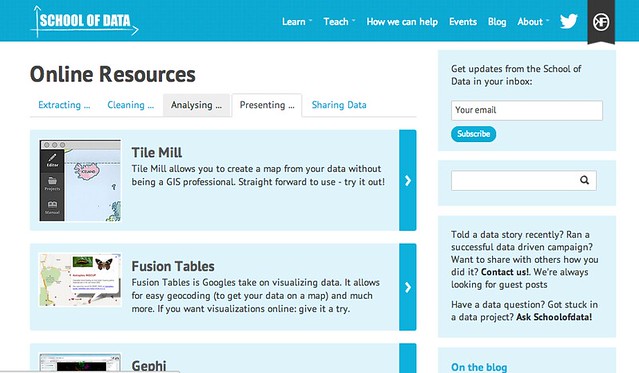
* The On Think Tanks blog has a great list of visualisation resources
* Digital Methods Toolkit from the Digital Methods Initiative.
Let’s look at the specific problems the group raised and what tools we know to help with them!
Getting Data: “What’s the best tool for conducting an online survey?”
The results of a great #groupthink from the room, who knew many options I’d never heard of – here’s what they came up with/ In no particular order:
- Survey Monkey
- LimeSurvey
- Umfrage online
- Qualtrics
- QuestionForm
- Google Docs (see “forms”)
- Question Pro
- SurveyGizmo
- SoGoSurvey
- FluidSurvey
- Stellar survey
- Adobe tools
- Survey factory
- Checkbox
- Cvent
- Objectplanet.com
- Instant survey
- New addition 8/11/2013 via @@shoha99 Survey Sidekick
- New addition 20/11/2013 via @zararah All our ideas
Special thanks to Dora Hardy from Open Society Foundations for this list!
Keen to hear from you which is the best – please feel free to drop comments in the section below.
Getting Data: “My government doesn’t give me data!”
Try asking publicly! Check out online Freedom of information sites on the web such as AsktheEU. Many countries also have their own sites!
Tip: Want to see examples of how people have ensured they get machine-readable data (i.e. spreadsheets not PDFs) from Freedom of Information request. See this successful example of asking for the EU budget to see what to ask for!
Extracting Data: “My data is trapped in a PDF! Help!”
We focussed today on Tabula – a great tool which allows you to highlight tables in a PDF and extract them as CSV files. Unfortunately, it struggled with a Cyrillic copy of the Serbian Gazette, but here’s hoping that future updates will help to support other character sets.
Want more information about other options? Try the School of Data course on PDF extraction
Cleaning Data: “Are there any tools to automatically assess data quality?”
Getting into potentially dangerous territory here, however, one suggestion was made. Open Studio, by Talend – I don’t have experience with it myself, but again – any testimonials from personal experience, please drop them in the comments box.
Analysing Data: “I have huge volumes of documents and don’t know where to start”.
Projects such as Document Cloud allow you to upload and search lots and lots of documents (even PDFs). Check out also The Overview Project for an example of a tool which helps to visualise common topics in a big dump of documents and links between themes in documents. Below: visualisation of the Wikileaks War Logs: Large Words = commonly occurring words, Points = Documents, Lines = show which documents connected to the topics.
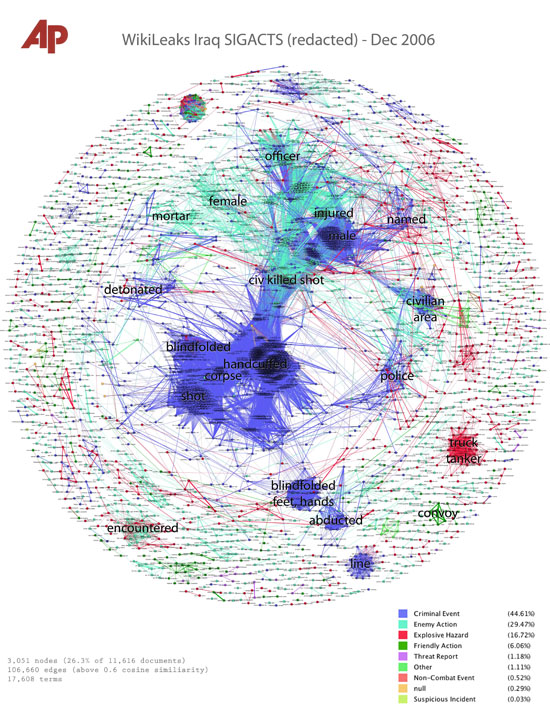
Overview, by the Associated Press
Analysing Data: “Do you have a primer for network analysis?”
Sure do! Check out this quick guide – we promise to update it soon to take account of new changes to the Twitter API.
What else we showed.
The final part of the workshop was dedicated to a quick session on Geocoding. Using a Google Spreadsheet and using some highly refined copy and paste skills from the School of Data tutorial on Geocoding, we created a beautiful TileMill map in the themed colours of ExpertForum.
If you want to get a map in your themed colours, you’ll need a colour capturer to grab your organisation’s colours. I used “Hues”, available in the App Store, but there are lots of options available.
Black magic
After the session, I showed a couple of people how to get data out of tables online where copy-paste doesn’t work. Check out the School of Data tutorial on IMPORTHTML if you have similar problems!
Final plug
Thinking of entering the On Think Tanks Datavis competition? Check out these guidelines by, School of Data Advisory board member, Gregor Aisch (DrivenByData) to avoid committing a visualisation faux-pas.
Submissions for the On Think Tanks Data Visualisation Competition close on 20th November. Get your submission in now!
Enjoyed this? Want to stay in touch? Join the School of Data Announce Mailing List for updates on more training activities from the School of Data.
]]>For any participants participating in the Open Government Partnership Summit in London tomorrow – 30th October. Join us for a training session on how to work with company data.
What’s special about companies data?
Company data is tricky, it’s often hard to determine who exactly the companies in corporate databases are.
As Amrit Naresh from OpenOil explains:
“People don’t usually don’t talk in the language of official jurisdictions and corporate identifier numbers. It’s common to say that ‘X’ has done this terrible thing or ‘Y’ did that, but without knowing exactly which X or Y entity (with the full name and the corporate registration number) did it, it’s impossible to know who exactly is responsible. Another example would be the case of a company like A*, which has a contract with Nigeria’s state oil company. But is it A* Energy International PLC (registration # abc) which signed the contract, or is it A* Energy PLC (registration # xyz)? Each company may have an entirely different corporate track record or top level personnel. The media rarely reports the full names and corporate identifiers of companies involved in transactions, so it’s difficult to know which entity exactly is being discussed.”

Open Corporates Training.
What we’ll cover
- How to discover and report accurately on which company is being referred to
- What is beneficial ownership and how can you research it using OpenCorporates – a powerful tool for investigating companies
- Researching networks of companies: particularly co-directors look at co-director networks
- The new network exploration tools in OpenCorporates
When: 10.45-12.45
Where: Floor 5 festival area
Link: See more details.
Can’t make it?
We’ll publish slides and a writeup from the event shortly. Watch this space.
Get the latest from the School of Data, sign up for the newsletter.
]]>Let’s also welcome another new member of the School of Data team, Neil Ashton.
You may remember Neil as the editor of the blog’s Data Roundup for the first half of 2013. Neil has now joined the Open Knowledge Foundation as a writer and analyst and will be working on School of Data as well as other OKF projects. His mission is to improve project documentation and to bring the OKF’s work to a wider audience.
Neil is fresh out of graduate school, where he studied computational linguistics. Through his research, he has written on topics ranging from the grammar of Tocharian pronouns to probabilistic logic programming. Neil lives in Toronto with his wife and newborn son.
Neil can be reached at [email protected].
]]>
This is a quick introductory post to welcome Milena Marin to the School of Data team.

Milena is based in London and joined Open Knowledge Foundation as Project and Workshop Coordinator for School of Data. Among others, she will be working with and supporting local partners, building the School of Data network around the world, and organising events, workshops and trainings.
Before joining us, she worked for over 4 years with Transparency International (TI) as Data and Technology Coordinator. Milena led the documentation of legal aid provided by TI’s Legal Advice Centres, ensuring an effective use of technology during this process, as well as supporting local partners with their data collection and analysis challenges. She was also responsible for coordinating and promoting the use of technology and the development anti-corruption solutions and tools across the TI Movement.
You can contact Milena at milena.marin [at] okfn.org or and follow her on Twitter.
]]>A bumper edition of the Latest from School of Data!
Travels Galore
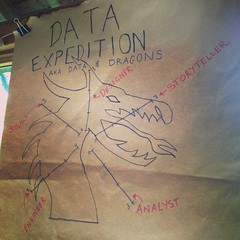
- Data Diva Michael Bauer, and OKF’s International Community Manager Zara Rahman completed their whirlwind tour of Latin America to meet the Data Lovers of the Continent and launch the Spanish language School of Data. Read about what they got up to on the OKFN blog
-
Meanwhile, Lucy was at the InfoActivism camp, for an incredible week of learning about how activists use technology. There are tutorials (many, many tutorials), blog posts and writeups from the data expedition on mapping Key Points in South Africa at the camp (the first data expedition to involve real bloodshed ) in the pipeline.
We’ll attempt to squeeze our brains dry of everything we learned and document it for you but in the meantime, follow the #ttccamp13 hashtag and Tactical Tech (@info_activism) for tips in 140 characters from brave and brilliant folks at the camp.
Hola – Escuela De Datos!
- Escuela De Datos, the Spanish language version of School of Data, launched spectacularly at AbreLatam last week Many thanks to everyone who helped it happen, especially Social TIC, the Hacks/Hackers communities in Chile and Argentina and the organisers of AbreLatam.
Since the launch – many organisations have been in touch to ask how they can also start their own version in their country. We’ll be publishing a local groups guide soon – so watch this space!
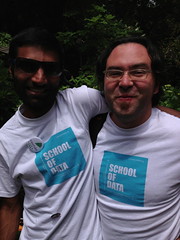
Get Involved
Community Mentors
Our call for our pilot cohort of Community Mentors will stay open until Friday, then we’ll get rolling on kitting them out to ghostbust data trouble around the globe.
Haven’t had chance to sign up yet? Here’s your opportunity.
Data Roundups
We’re looking for a new volunteer (or a team to take it in turns) to take over the weekly Data Roundups from Neil Ashton, as he manages with small baby!. If you are interested – please let us know on schoolofdata [at] okfn.org.
Ask.SchoolofData.org
A very busy week for Ask.SchoolofData.Org – here’s just a few of the questions which have been asked and need your help!
- UNANSWERED Open Refine – is there a difference between a starred and a flagged row?
- Is it possible to make interactive data visualisation using HTML5 ?
- Is there any difference between a SVG and an AI file?
Thanks to new faces Andrew Duffy, “OpenSAS” for their help both in asking and answering!
From the blog
- Data Roundup July 3
- Slaughtering People: A Multimedia Investigation into the Global Market of Meat
- Tax Avoidance and Evasion Expedition: Looking back
- Data Roundup – June 26
- Data MOOC – Findings, Results and Recommendations
- Cursive Data: Drawing by Robots.
Ciao for now!
Want to receive these updates in your inbox? Make sure you are on the School of Data Announce List.
]]>CursiveData.co.uk converts real time data into slowly growing online visualisations that are simultaneously brought to life by drawing robots. Robot artists use new website to turn live data into art.
A Bristol-based engineer has found a new way to bring data to life – with robots. Since last year Matthew Venn’s ‘Polarbots’ have been drawing pictures on walls in response to energy use – the pictures change as the power goes up or down. But Venn realised any live data could be visualised this way and now with help from Bristol Council, he and his collaborators have built a website that transforms data into art in real-time: www.CursiveData.co.uk. The ever-changing pictures that result can be drawn by Polarbots or embedded in websites.
“The big difference between cursive data and other types of data visualisation is that cursive data provides continually growing visualisations, ones that respond to change.” – Matthew Venn
Any live data can drive Cursive Data visualisations but Venn’s focus is still on energy. He says, “energy is abstract and invisible but it is important that we notice it”. The team hopes that their live data art will help people waste less energy and be more aware of their greenhouse gas emissions. A grant from Bristol Council has allowed Venn to build a public Polarbot and work with a local artist to develop new ways to respond to energy data. A diverse team of programmers and engineers have collaborated on the project.

A robot drawing numbers of tweets at Newcastle maker faire
Venn will be talking about the project at Dorkbot (18 June 2013) and Pervasive Media Studio (21 June 2013). Programmers and artists will come together to develop new ‘pattern generators’ for www.CursiveData.co.uk at an event on 7 July 2013.
How www.CursiveData.co.uk works
Cursive data collects data from any web-based data source. Venn’s own home energy monitor is connected this way. When enough data has been collected it is passed to a pattern generator that adds new elements to the continually changing image. The pattern generators can be programmed to react in many different ways. One of the early patterns places leaves on a tree. The size of the leaves corresponds to the energy being generated by a solar power array that Cursive Data connects it to.
How Polarbots work
Polarbots draw by hanging a pen from wires that are controlled by motors. Their movement is determined by a Cursive Data ‘pattern generator’. As they move they can pull a pen across the wall, or lift it off the wall.
]]>Here’s the latest from around the School of Data:
Escuela de Datos
Data troopers Michael Bauer and Zara Rahman have been on the road in Latin America doing a series of great warmup events with the help of the fabulous network of Data Activists from around Latin America.
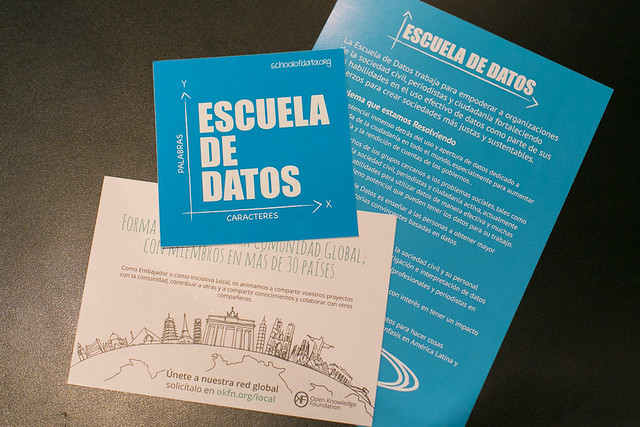
Credits: James Florio. Poderomedia
- See what they’ve been up to in the writeup the Hacks/Hackers meetup in Chile.
- Henceforth, they will be in Uruguay for the AbreLatam conference. Know someone they should meet there? Tweet @Schoolofdata – or email us on schoolofdata [at] okfn.org.
Stay up to date with School of Data Latin America
Spanish
- Twitter – @Escueladedatos
- Announcement mailing list (low traffic)
- Discussion mailing list: Coming soon
Portuguese
- Twitter – @Escoladedados
- OKFN Brazil Mailing List – for discussion.
Get Involved!
We’re looking for a select handful of community mentors to take place in a pilot mentoring scheme to guide learners through future data expeditions (online or offline), and/or offer training sessions on a particular topic or tool, via Google Hangout or in person.
Learn more
We will offer training, support and swag (stickers and shirts) for our pilot mentors!
Ask.SchoolofData.Org
The following questions are looking for answers, can you help?
- Extracting data from wikipedia tables
- Problem installing Gephi on Mac OS
- Is there any difference between a SVG and an AI file?
Offers of help
- Andy South has offered to run a course in mapping with R for NGOs who can cover his travel costs! See the course.
From the blog
- InfoAmazonia and Why We Should Talk About Geojournalism
- Data Roundup 19th June. By Neil Ashton.
- Data Explorer Mission from the Inside: an Agent’s Story – Want to know what happened on the data explorer mission? One of the participants explains what they got from the experience.
- On the Radar: Using Data to Save Lives – Invisible Children and the LRA crisis tracker. Invisible Children and the LRA crisis tracker.

